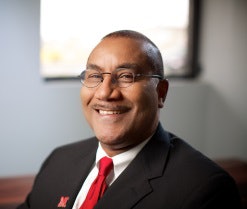 University of Nebraska―Lincoln’s Dr. Joseph Francisco, dean of the College of Arts and Sciences, describes his leadership style as “very collaborative.” (Photo by Robert Ervin)
University of Nebraska―Lincoln’s Dr. Joseph Francisco, dean of the College of Arts and Sciences, describes his leadership style as “very collaborative.” (Photo by Robert Ervin)Even though the University of Nebraska―Lincoln’s Dr. Joseph Francisco didn’t have a role model at home who had gone to college — his grandparents, whom he lived with, did not go further than the second and third grade — he built his foundation to be a leader in academia there.
“They were hard-working people, and they worked together as a team,” says the newly minted dean of the College of Arts and Sciences. “I saw what they were able to accomplish when they worked together, and that value was set by them. They really influenced me in that regard.”
And while Francisco didn’t have access to tools and technology to learn about science living in Beaumont, Texas, as a kid, exploring along the railroad tracks and researching his discoveries at the public library piqued his interest in what he would eventually study: atmospheric chemistry.
“I had people in the community who helped foster that and develop that,” he says. Francisco soon left his refinery hometown for The University of Texas at Austin to study chemistry. “That was another key moment,” he notes.
In college, a chemistry professor, Dr. Raymond Davis, singled him out from a class of 350 students to conduct research as a freshman with math students and postdocs.
“Working in a laboratory was very important because I was being groomed and nurtured to go to graduate school. I learned what it was about and what it would take to be successful,” he notes.
Francisco’s research caught the eye of an Australian professor who invited Francisco to do research in his home country. “Going abroad changed my whole sense of how I look at science and how I look at things, not only with the environment,” he says.
Davis, also Francisco’s college adviser, then encouraged him to go on to graduate school. After earning a doctorate in chemical physics at MIT, he continued his work as a postdoc at Cambridge University in the U.K.
“There I really started to develop a network of colleagues [whom] I collaborated with internationally,” he says.
This has carried over into his leadership, as the College of Arts and Sciences is working with scientists in Spain and France. “We’re looking at the chemistry that takes place around clouds — we’ve discovered some novel, cool things that relate to cleaning up air pollution,” he explains.
When it comes to his research, Francisco looks for areas in which he can create knowledge. “I ask, ‘How does it help people?’”
He aims to have the College of Arts and Sciences’ work extend out to the community and world. “We have to have a broader impact,” Francisco says.
Indeed, Dr. Xiao Cheng Zeng, an emeritus professor at the university who worked with him while he was the William E. Moore Distinguished Professor of Earth and Atmospheric Sciences and Chemistry at Purdue University, also sees this quality in his work. “It connects vested interests of society, such as environmental and energy issues,” says Zeng.
Francisco has a firm vision yet is still down to earth, says Zeng. “My leadership style is very collaborative. I find that certainly I don’t pretend to know everything,” says Francisco.
Dr. Aaron Dominguez, associate dean for research and global engagement in the College of Arts and Sciences, agrees. “He is inclusive, transparent and he identifies important issues. He’s very good at building partnerships. As a Chicano physicist, I certainly see him as a role model.”
Indeed, Francisco served as an example in his own community with his first academic appointment, as an independent scholar at Wayne State University in Detroit.
“I teamed up with a local youth minister at one of the big African-American churches and set up a tutoring program to get students who were majoring in the sciences to spend an evening working with young people to tutor them in math and science,” he says.
This initial outreach has stayed with him throughout his career.
“Kids have an interest in science. They are excited, but many of them don’t really have the opportunities to really nurture that and grow that that much,” Francisco notes. “The talent is there, but I think they need the opportunity to nurture that talent.”


















